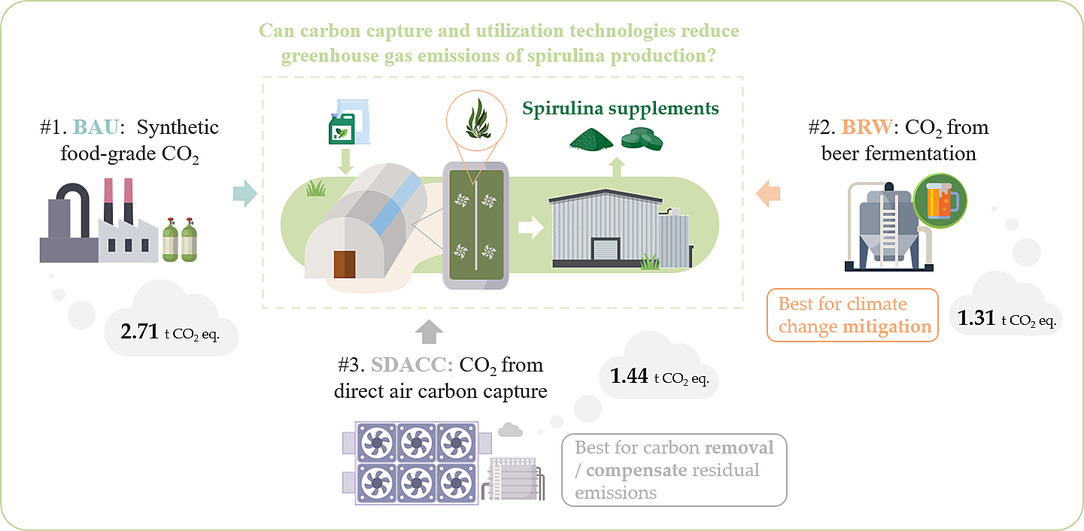Carbon accounting of negative emissions technologies integrated in the life cycle of spirulina supplements
September 10, 2023 | Science of The Total Environment |
Introduction: Research team from University of Cantabria in Spain evaluates carbon capture and utilization (CCU) technologies using Life Cycle Assessment (LCA). The research focuses on the case study of replacing synthetic food-grade CO2 in spirulina production, a nutritionally rich algae product with CO2 captured from beer fermentation (BRW) and CO2 from Direct Air Carbon Capture (DACC).
Key findings: Results reveal that both CCU scenarios outperform the Business as Usual (BAU) scenario, demonstrating a 52% reduction in greenhouse gas emissions for BRW and a 46% reduction for DACC. While the brewery CCU offers a more substantial carbon mitigation, it falls short of achieving net zero emissions due to residual burdens across the supply chain. In contrast, the DACC unit holds promise as it could potentially supply the required CO2 for spirulina production and serve as a CO2 removal solution to offset residual emissions. This opens avenues for further exploration of DACC's technical and economic feasibility in the food sector.
Read more: Carbon accounting of negative emissions technologies integrated in the life cycle of spirulina supplements

Fig. | Carbon capture and utilization technologies in the production of spirulina.
Viewed Articles
September 10, 2023 | Science of The Total Environment |Â Â Introduction: Research team from University of Cantabria in Spain evaluates carbon capture and utilization (CCU) technologies using Life Cycle
Read More
April, 2023 | Environmental Challenges | Source |  Introduction: Upstream greenhouse gas (GHG) emissions (i.e. scope 3)—accounting for 70–90% of the dairy industry’s total emissions—pose a persistent
June 20, 2021 | Journal of Cleaner Production | Source | Introduction: Researchers from the University of Michigan (USA) analyzed the lifecycle GHG emissions of perishable foods—vegetables, fruits, me
March 13, 2023 | Nature Food | Source | Â Introduction: Food loss and waste (FLW) are major contributors to global GHG emissions, yet their full impact across the food system has been underexplored. A
May 1, 2024 | Journal of Cleaner Production | Source | Â Introduction: Region-specific strategies are critical for China to balance crop production and environmental sustainability. This study, led by
December 15, 2023 | Journal of Environmental Management | Source |  Introduction: Livestock production is a significant source of greenhouse gas emissions (GHGE) in China, challenging the country’s 20






